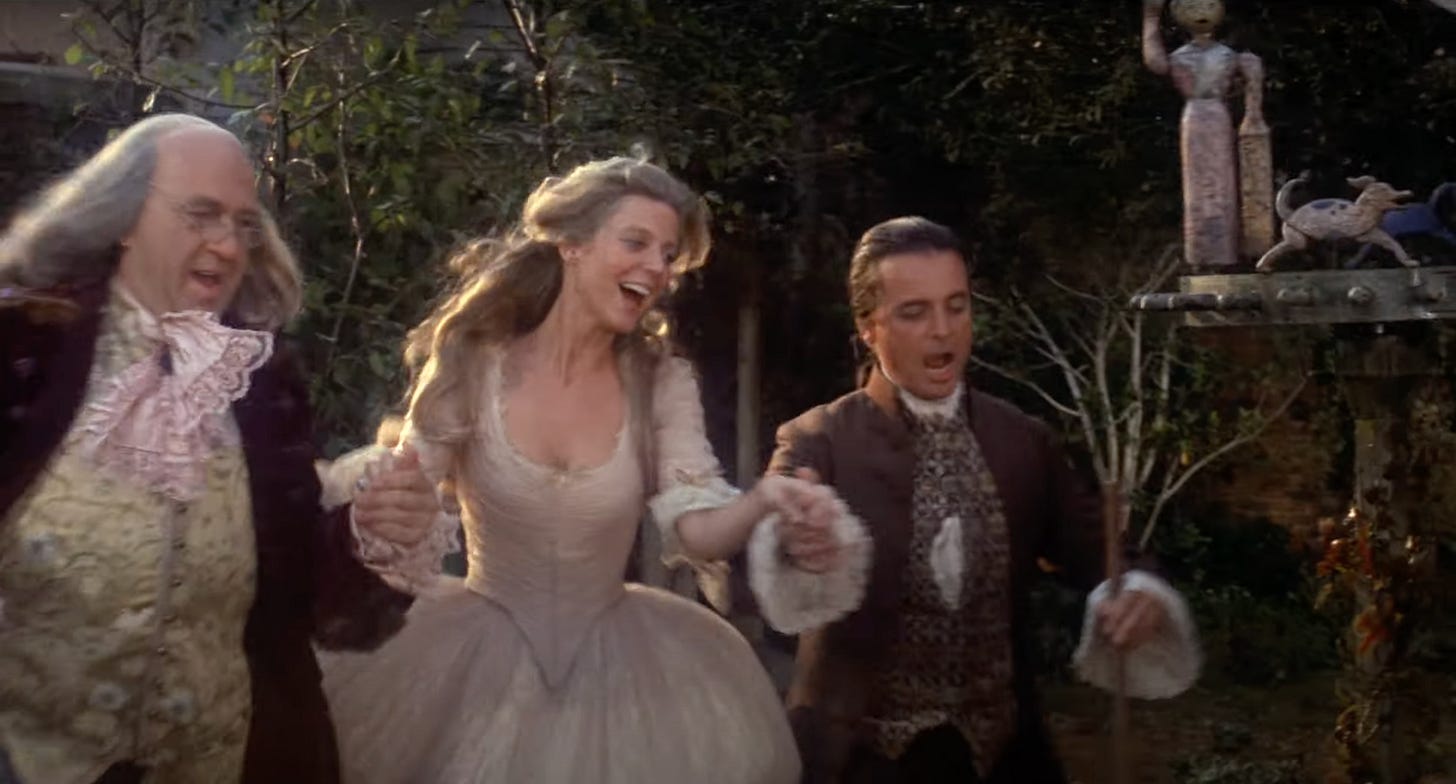“Well, I’ll never appear in the history books anyway,” John Adams says.
He’s wrong, of course. A library’s worth of history books and biographies focus on or at least mention John Adams. And not even just that—he’s become a familiar figure of the stage and screen. Most recently, the Broadway musical Hamilton referenced him as an offstage character. Several years earlier, the HBO miniseries John Adams earned several shelves’ worth of Emmy Awards.
But to me, the definitive dramatic interpretation of Adams can be seen in 1776 (which the above quote comes from). The stage musical and 1972 movie will make you believe a congress can sing, and that alone is an extraordinary feat.
The musical reinterprets the story of the Declaration of Independence, specifically the political fight as the Continental Congress decided whether to declare independence from Great Britain. It takes liberties with the details, and it’s no substitute for reading about the actual history. It’s entertainment first and foremost. No musical can capture the full complexity of all these historical figures, but 1776 captures exactly the right spirit to celebrate Independence Day.
John Adams is the central character. William Daniels originated the role on Broadway, and he plays him masterfully in the movie. Adams’s chief allies are Benjamin Franklin (Howard Da Silva) and Thomas Jefferson (Ken Howard) while John Dickinson (Donald Madden) serves as the main antagonist.
Political debates tend to be tedious affairs, so how on earth does a movie about one work so well? It’s not just the songs, though most of them are great. It’s what’s at the heart of the songs, dialogue, and blocking.
John Adams believes in something. He believes in it passionately, to the point in which he’s staked his entire life and reputation on this idea. He’s imagining a better world, and he’s determined to unite others around his cause. He wants and needs people to see what he sees.
It’s right there in the excellent final song.
But he’s not well suited for this role. He’s “obnoxious and disliked; that cannot be denied.” Adams is anything but a diplomat or a natural politician, but he’s stubborn and tenacious. He displays a compelling mix of flaws and strengths. Adams is one of the more relatable Founding Fathers, and that works to the musical’s benefit. The man was no demigod (none of them were), and the musical never pretends otherwise.
And it never pretends that John Dickinson was some evil villain. And he wasn’t. He was merely wrong, but you can’t blame someone for expressing skepticism about a revolution, given the way many of them turn out. The movie doesn’t exactly flatter Dickinson at all times, but it respects him enough to let him have his say.
As Stephen Hopkins (Roy Poole), the Rhode Island delegate, says, “Well, in all my years I ain’t never heard, seen, nor smelled an issue that was so dangerous it couldn’t be talked about.”
The script adheres to that principle. Dickinson, like Adams, isn’t portrayed as any sort of saint, but like Adams, he’s fighting for a cause he believes in—peaceful reconciliation, in his case. He accepts defeat graciously. When he refuses to sign the Declaration, he’s not being petulant; he’s following his conscience. And he goes even further. He pledges to serve in the army to defend his country (which was true) even though he believes his country is headed down the wrong path. The Congress, led by Adams, gives him a show of respect as he departs. Dickinson is an interesting historical figure and was certainly no one-note villain.
As a musical, 1776 indeed entertains, and it’s even a little whimsical at times. With witty dialogue and colorful songs such as “Sit Down, John,” “But, Mr. Adams,” and “He Plays the Violin,” it could easily be mistaken for an overly sanitized historical romp.
While it includes some romping, there’s much more going on.
The exchanges with Abigail Adams (Virginia Vestoff) allude to the hardships on the home front. “Mama, Look Sharp” describes the experiences of a typical young soldier. The script acknowledges the moral compromises needed to ensure political unity, particularly on the issue of slavery, which adds a painful note of failure to what is otherwise a remarkable achievement. And the entire time, the movie understands that the odds were against the American Revolution and that these men risked being executed for treason. But they followed their convictions anyway.
The musical takes its subject matter seriously, but it doesn’t take itself too seriously. It strikes exactly the right balance between entertainment, reverence, and humanity.
Watch 1776 this Independence Day, no matter how many flies there may be, and replay the soundtrack every now and then throughout the year.




"Political debates tend to be tedious affairs, so how on earth does a movie about one work so well? It’s not just the songs, though most of them are great. It’s what’s at the heart of the songs, dialogue, and blocking." -Great post! Happy Fourth of July.
1776 is a rare musical film in that nearly all of the actors were the original cast from Broadway. An excellent preservation of musical film history and a genuinely fantastic movie. The characters feel human, this depiction of early America breathes life into the history book, and it doesn't shy away from the ugly issues or the hardships of that era.
If you haven't listened to the 1997 revival's version of "Is Anybody There," I highly recommend it. It exceeds the film's performance. https://www.youtube.com/watch?v=L3Fee14arXc
My one and only quibble with Hamilton is that they took jabs at Adams offscreen, so to speak, which is yet another reason I'm glad 1776 exists.